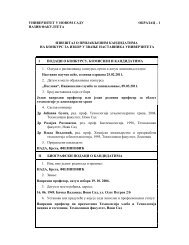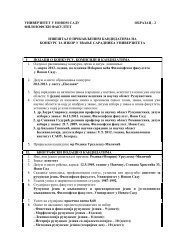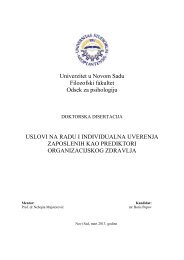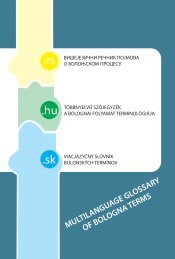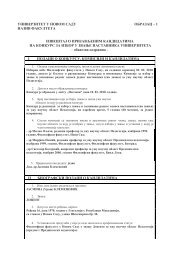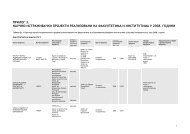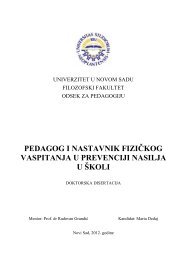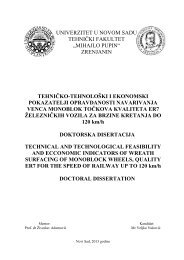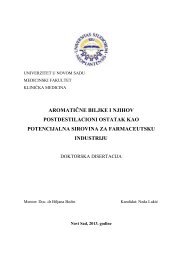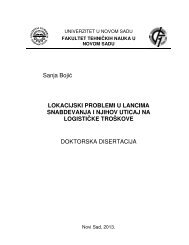Intercultural competence as an aspect of the communicative ...
Intercultural competence as an aspect of the communicative ...
Intercultural competence as an aspect of the communicative ...
Create successful ePaper yourself
Turn your PDF publications into a flip-book with our unique Google optimized e-Paper software.
<strong>the</strong> students for <strong>the</strong> most part found <strong>the</strong>se issues unrelated to l<strong>an</strong>guage instruction <strong>an</strong>d<br />
learning. This might be seen <strong>as</strong> a possible weak area in teaching <strong>of</strong> English at <strong>the</strong><br />
university level where fur<strong>the</strong>r work on ICC is still needed.<br />
The culture <strong>as</strong>similator used for <strong>the</strong> study w<strong>as</strong> developed fur<strong>the</strong>r <strong>an</strong>d c<strong>an</strong> be used<br />
<strong>as</strong> a teaching <strong>an</strong>d <strong>as</strong>sessment tool in <strong>the</strong> educational context. Since <strong>the</strong>re have not been<br />
<strong>an</strong>y techniques developed specifically for <strong>the</strong> Serbi<strong>an</strong> context, <strong>the</strong> culture <strong>as</strong>similator<br />
might provide <strong>the</strong> starting point for material development for our local purposes.<br />
Since no similar research h<strong>as</strong> been done in Serbia on <strong>the</strong> topic <strong>of</strong> ICC, <strong>the</strong> study<br />
gives a contribution to applied linguistics <strong>an</strong>d a signific<strong>an</strong>t first step in terms <strong>of</strong> <strong>of</strong>fering<br />
both <strong>the</strong> relev<strong>an</strong>t literature review <strong>an</strong>d <strong>the</strong> data for fur<strong>the</strong>r research.<br />
The mixed methods approach used in <strong>the</strong> study is not a preferred method <strong>of</strong> choice<br />
for applied linguistic research in Serbia, <strong>the</strong>refore <strong>the</strong> study shows <strong>the</strong> import<strong>an</strong>ce <strong>of</strong><br />
applying multiple perspectives to complex problems <strong>as</strong> <strong>the</strong>y c<strong>an</strong> provide a greater r<strong>an</strong>ge<br />
<strong>of</strong> divergent views.<br />
The study provided <strong>an</strong> insight into <strong>the</strong> functioning <strong>of</strong> <strong>the</strong> ICC <strong>of</strong> probably <strong>the</strong> most<br />
import<strong>an</strong>t population – students, <strong>as</strong> future educators <strong>an</strong>d social agents, thus showing what<br />
<strong>as</strong>pects should be taken into consideration when educating students to be global citizens.<br />
6.2. Pedagogical implications<br />
There are several pedagogical implications for students at <strong>the</strong> university level that<br />
follow this study. Firstly, since m<strong>an</strong>y students would work directly with o<strong>the</strong>rs <strong>an</strong>d m<strong>an</strong>y<br />
<strong>of</strong> <strong>the</strong>m in education, it is essential that students have some intercultural training<br />
incorporated in <strong>the</strong>ir cl<strong>as</strong>ses – <strong>of</strong> a foreign l<strong>an</strong>guage or <strong>as</strong> a separate course. Stereotypical<br />
perceptions <strong>of</strong> o<strong>the</strong>r nations, in this c<strong>as</strong>e, Anglophone ones, are still present <strong>an</strong>d should be<br />
dissuaded, while at <strong>the</strong> same time one’s own culture should be explored <strong>an</strong>d <strong>an</strong>alysed.<br />
More specifically, for <strong>the</strong> English l<strong>an</strong>guage students, <strong>as</strong> most definitely future<br />
l<strong>an</strong>guage teachers, ICC training <strong>an</strong>d instruction would be invaluable for <strong>the</strong>ir improved<br />
teaching skills. The current practice at <strong>the</strong> English l<strong>an</strong>guage department in Niš h<strong>as</strong> shown<br />
that one elective course on ICC is not enough, especially since ICC is closely related to<br />
sociolinguistic <strong>an</strong>d pragmatic knowledge. As some authors show, <strong>the</strong> linguistic<br />
pr<strong>of</strong>iciency signals to interlocutors’ intercultural pr<strong>of</strong>iciency <strong>as</strong> well which is why IC<br />
misunderst<strong>an</strong>dings look graver <strong>an</strong>d more serious in <strong>the</strong>ir eyes.<br />
Even though <strong>the</strong> use <strong>of</strong> linguistic me<strong>an</strong>s w<strong>as</strong> not in <strong>the</strong> focus <strong>of</strong> <strong>the</strong> study, a closer<br />
attention could be paid to <strong>the</strong> choice <strong>of</strong> linguistic functions <strong>as</strong> <strong>an</strong> additional step when<br />
231



